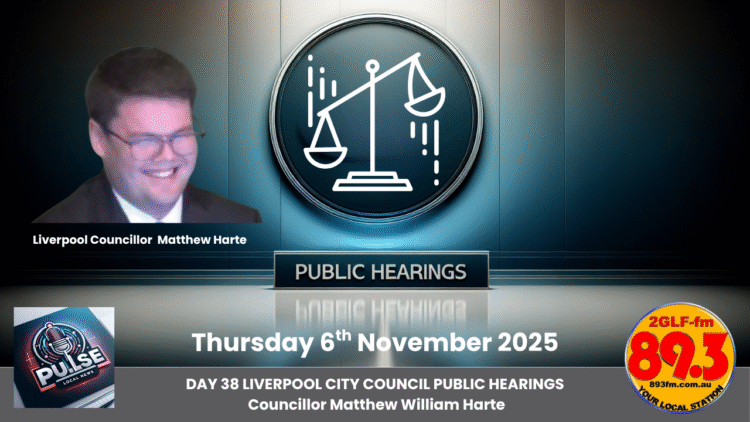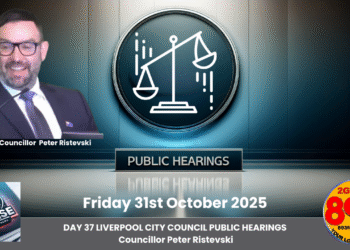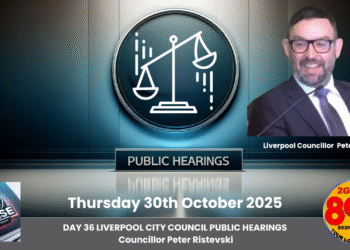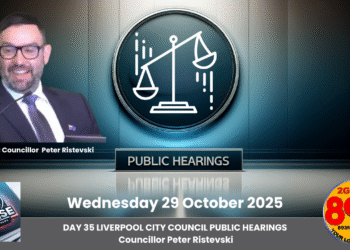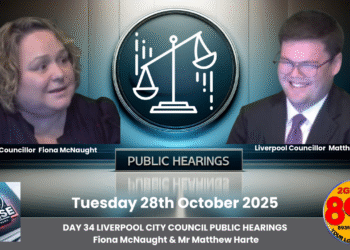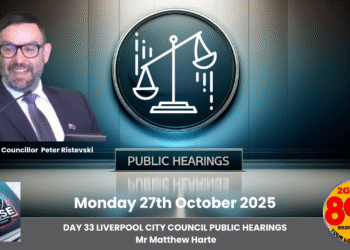On Thursday, 6 November 2025, the Public Inquiry into Liverpool City Council, commissioned under Section 438U of the Local Government Act 1993 (NSW), held its 38th day of public hearings in Sydney. The session commenced at 4:34 PM and featured testimony from Councillor Matthew William Harte, focusing on the appointment of Jason Breton as CEO, Harte’s involvement in Breton’s 2021 election campaign, and related political activities. Below is a factual summary of the day’s events, followed by an analysis of matters arising that would interest ratepayers, framed around the question: Are ratepayers getting good value for their money?
Summary of Proceedings
Councillor Matthew William Harte’s Testimony
- Appointment of Jason Breton as CEO: Councillor Harte confirmed his awareness of Jason Breton’s applications for the permanent CEO position at Liverpool City Council in 2022 (where Breton was unsuccessful, and Mr Ajaka was appointed) and again in 2025. In 2025, following an independent process managed by Chandler MacLeod with over 100 candidates, Breton was unanimously appointed as permanent CEO at an extraordinary council meeting on 15 April 2025. Harte clarified he was not present at this meeting and had no role in Breton’s selection.
- Breton’s 2021 Election Campaign: Harte was questioned about his involvement in Breton’s failed 2021 election campaign, described by Breton as a “fundamental failure.” Harte acknowledged Breton as a political novice with no prior council election experience and not his first choice as an independent candidate. Text messages from July 2021 (MFI 30) revealed Harte had another independent candidate lined up before Breton, stating he would manage their campaign. Harte also confirmed Breton’s attempts to secure preference deals with other candidates were unsuccessful, as only two responded, and these deals did not affect the election outcome.
- Campaign Support and Documentation: Harte admitted to assisting Breton with campaign forms (nomination and post-disclosure forms), accessing the NSW Electoral Commission portal on Breton’s behalf using shared login details, as Breton did not have direct access. Emails from November 2021 (MFI 31) showed Harte drafting a letter for Breton’s approval and receiving Breton’s signature for potential use on a flyer, though Harte could not recall specifics but accepted it as a possibility.
- Other Political Involvement: Harte testified about his current role as an electoral officer for state parliamentarian Tina Ayyad, elected in 2023, for whom he served as campaign manager starting in late January 2023. Further questioning on this topic was objected to by Harte’s counsel as irrelevant to the council inquiry, leading to a brief withdrawal of the witness to discuss the objection.
Matters Arising of Interest to Ratepayers: Are Ratepayers Getting Good Value for Their Money?
Ratepayers of Liverpool City Council are concerned about whether their contributions result in transparent governance, impartial decision-making, and accountable representation. The following matters from Day 38 of the inquiry highlight areas where value for money is in question:
- Governance and Transparency in Appointments:
- CEO Appointment Process: While Councillor Harte had no direct role in Jason Breton’s unanimous appointment as CEO in April 2025, the historical context of Breton’s multiple attempts (2022 and 2025) and prior political connections with Harte raise questions about the impartiality of council processes over time. Ratepayers may wonder if their money supports a council where past affiliations influence key appointments, even if indirectly, potentially undermining trust in the selection of senior leadership.
- Lack of Involvement: Harte’s absence from the critical meeting on 15 April 2025 and non-involvement in the CEO selection process could be seen as a missed opportunity to contribute to significant council decisions. If ratepayer-funded representatives are not engaged in pivotal governance matters, the value of their role in ensuring accountability and community representation may be diminished.
- Political Conduct and Ethical Concerns:
- Support for Political Novice: Harte’s assistance in Breton’s 2021 election campaign, despite acknowledging him as a political novice and not the first choice, alongside managing campaign logistics (e.g., forms, portal access, signatures), suggests a potential overreach in influencing electoral outcomes. Ratepayers may question if their elected officials’ time and resources—indirectly funded by ratepayer contributions—are being used for personal or political agendas rather than council priorities, reducing the perceived value of governance.
- Preference Deals and Campaign Integrity: Although Breton’s preference deals did not impact the 2021 election outcome, Harte’s awareness of these failed negotiations and his role in campaign management hint at a lack of transparency in electoral strategies. If ratepayers perceive that councillors engage in or support opaque political tactics, trust in fair representation erodes, questioning the value of their financial support to the council.
- Accountability and Community Focus:
- Relevance of External Political Roles: Harte’s involvement as campaign manager and electoral officer for a state parliamentarian (Tina Ayyad) in 2023, while post-dating some council activities, raises concerns about divided attention between council duties and external political commitments. Ratepayers may doubt the value for money if councillors’ focus is split, potentially impacting their effectiveness in addressing local issues and delivering community benefits.
- Memory and Specificity Gaps: Harte’s frequent inability to recall specific details (e.g., the purpose of Breton’s signature or prior awareness of preference deal attempts) during testimony could signal a lack of accountability or thoroughness. If ratepayer-funded representatives cannot provide clear answers on past actions tied to council-related activities, confidence in their oversight and responsibility wanes, affecting perceived value.
Conclusion
The Day 38 proceedings of the Public Inquiry into Liverpool City Council reveal significant challenges in transparency, political conduct, and accountability that affect whether ratepayers are receiving good value for their money. Councillor Harte’s historical involvement in Jason Breton’s 2021 campaign and lack of engagement in the 2025 CEO appointment process suggest potential impartiality concerns and missed governance opportunities. His support for a political novice and management of campaign logistics, alongside external political roles, raise questions about focus and ethical priorities. Additionally, gaps in memory and specificity during testimony undermine trust in accountability. Ratepayers deserve assurance that their contributions fund a transparent, focused, and responsible council, yet evidence from this hearing indicates areas where value for money remains uncertain. As the inquiry progresses, these issues warrant scrutiny to ensure improvements at Liverpool City Council.









